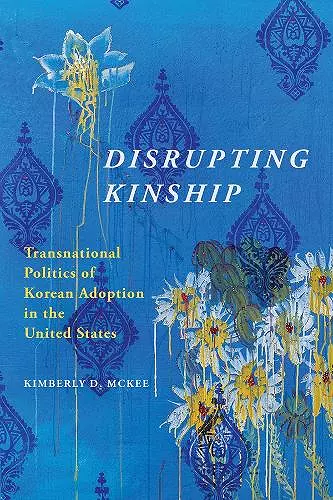Disrupting Kinship
Transnational Politics of Korean Adoption in the United States
Format:Hardback
Publisher:University of Illinois Press
Published:2nd Mar '19
Currently unavailable, and unfortunately no date known when it will be back
This hardback is available in another edition too:
- Paperback£20.99(9780252084058)

This book explores the complexities of transnational adoption, particularly focusing on the experiences of Korean adoptees in the United States and the industry surrounding it in Disrupting Kinship.
Since the Korean War began, Western families have adopted over 200,000 Korean children, with two-thirds finding homes in the United States. Most of these adoptees joined white families, creating a new form of transnational and transracial kinship. In Disrupting Kinship, Kimberly D. McKee delves into this complex social phenomenon, shedding light on how these adoptions have reshaped familial structures and cultural identities across borders.
McKee explores the emergence of what she terms the transnational adoption industrial complex, a multi-million-dollar global industry that has significantly influenced the lives of both adoptees and their adoptive families. This system is driven by an alliance of South Korean welfare agencies, orphanages, and American immigration laws, which together facilitated the transnational adoption process. The author argues that adoption often served as a means to address the inadequacies of South Korea's social safety net, particularly for unwed mothers and low-income families, while simultaneously commodifying children and allowing Americans to build families at the expense of biological connections.
In Disrupting Kinship, McKee also examines the intersection of various cultural and political factors, including Christian Americanism and South Korean welfare policy. She highlights how these elements interact and challenge American perceptions of nationhood, citizenship, belonging, family, and ethnic identity, ultimately prompting readers to reconsider the implications of adoption within this broader context.
"McKee's intersectional feminist perspective on the complexity of transnational adoption is crucial for broadening the practices of kinship so that adoptive families are not predetermined as the better and only future." --Journal of American Ethnic History
"In Disrupting Kinship, Kimberly McKee unpacks the macro and micro dimensions of adoption's impact on the lives of Korean adoptees, and charts the development of what she calls the transnational adoption industrial complex. Her book is required reading for its critical interdisciplinary approach to understanding the history of Korean international adoption and its legacy."--Catherine Ceniza Choy, author of Global Families: A History of Asian American Adoption in America
"Disrupting Kinship is a timely book that contextualizes the creation and history of the transnational adoption industrial complex and identifies many of adoption's effects and repercussions, systematically as well as individually. McKee skillfully connects the historical construction of adoption to contemporary issues through diverse interdisciplinary approaches." --Adoption and Culture
"McKee challenges the mainstream adoption narrative, which privileges notions of love and family by focusing on the rhetoric of child-saving rescue. . . . A welcome contribution to the study of Korean transnational adoption, especially through its engagement with the concepts of family, kinship, belonging, citizenship, and agency." --H-Net Reviews
"Disrupting Kinship is a vital contribution that makes visible the transnational adoption industrial complex as a de factor social welfare option, and a sociopolitical reality that adoptees negotiate in daily life." --Journal of American-East Asian Relations
ISBN: 9780252042287
Dimensions: 229mm x 152mm x 23mm
Weight: 481g
250 pages